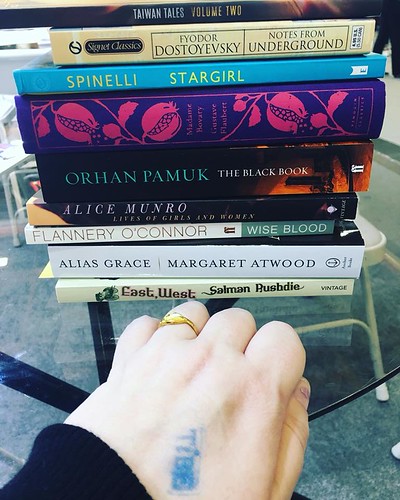 |
| My haul from the 2018 Taipei International Book Exhibition |
Just so you know, this story has very little to do with Taiwan, though it comes around in the end.
I started taking a greater interest in my parents' bookshelves in high school. They were voracious readers and book collectors, and had some fine and rare editions, but also quite a collection of paperbacks from the 70s that browned by half a shade every year. You could have measured my age by their wear and coloring.
Bored with homework - I never really did it, it just didn't seem necessary - I idly picked up a dusty copy of Madame Bovary one afternoon and slid right into a world of century-old female dissolution.
Two things were true then. The first was that I was a broad-shouldered, wide-hipped teenage girl: not fat (then), but certainly not lissome. You could tell I was either going to grow up to be strong and intimidating, or soft and...not. (I like to think I ended up being soft and intimidating, personally). I wasn't pretty, but I was outspoken, nerdy and weird. Sort of like now, but less refined in how I channeled that energy.
The second was that I obviously knew what sex was. I'd read quite a few dime-a-dozen romance novels just for fun. The ones from the library one town over, of a slightly higher caliber (better sex) than the ones that cost $1.99 at the supermarket. But, especially as you'll be shocked to hear that I didn't exactly have a parade of boyfriends in high school, I knew nothing of sexual politics - who and what society calls degenerate and why, gender-based power and subjugation, all of it - or sex and the human condition.
What I mean is, big girls from small towns tend not to know a lot about the world.
As you can imagine, I drank the sweet, sexy French corruption of Madame Bovary as I emerged from the worst trials of the gauntlet of puberty the way a small-town athlete slugs Coke after a match.
Soon after I began reading, at school we were tasked with an open book report: find a book we'd like to read - any book - and write about our impressions of it. I was already reading Madame Bovary, so I decided I may as well write about it. My English teacher didn't object, but he did call my parents. A small high school in a small, almost entirely Catholic town? She wants to read a book that doesn't exactly scream Family Values? Best to check.
I was in the room when Mom took the call. "Yes, we know. She's already reading it. Yes, of course she can. She can! She got it from us!... Hah! Thanks for checking, but what kind of people do you think we are? Do you think we're..hmph...parochial?"
And that's how, as my classmates stole their dads' racy magazines (this was in the nascent years of the Internet, before we all looked for porn online), I ended up writing an ear-reddening book report about 19th century French smut.
Except it wasn't really smut.
More obtuse readers might mistake Madame Bovary for a morality play, in which Flaubert sits in judgment of the spiraling depravity of a convent-educated beauty who could not accept a simple, clean country life. If that were true, it would have been read and tossed by a bored big-hipped girl from a small town without a second thought. But no - Flaubert was well aware of the limitations women faced in his day, and how that could lead to a woman venting frustrations she couldn't even communicate to herself let alone to those around her by making a series of escalating bad choices. It was quite possibly my first encounter with a man who understood this, and was sympathetic. Of course, it took years to really sink in.
It struck me how it was never made clear whether Emma Bovary was highly intelligent or just an average person who fancied herself high-minded: as it was with all women, her intelligence was just that irrelevant to her life, her marriage and her social environment. It also struck me that the issue was never that she couldn't accept her lot, but that she was never able to seek a life that suited her.
As I grew up and moved away, I had more opportunities than Emma Bovary and took them - and yes, privilege played a role in that. I am an educated middle class white girl after all. In any case, I refused to apologize for my more libertine tendencies - why should I? After all, cheese is available - and when I encountered a person or force trying to limit me, remembered Ani DiFranco's old nugget o' wisdom, which Emma herself might have expressed if she'd been better equipped to do so: you may be able to keep me from ever being happy, but you're not going to stop me from having fun. (Hey, it was the late '90s).
And that is how a work of 19th century French smut which wasn't really smut likely influenced my decision to eventually move to Taiwan. The alternate-universe girl who didn't see a future version of herself in Madame Bovary if she didn't insist on something better is probably not very happy.
And that is how I found myself buying an expensive hardcover edition at the Taipei International Book Exhibition, which ended this past weekend. I took one look at those lurid pink pomegranates on the binding and thought, "hey, I have lurid pink pomegranates on my binding, too!"
What I mean is, that book is a part of my formative years. And I ought to own nice editions of the books that have influenced me.

No comments:
Post a Comment